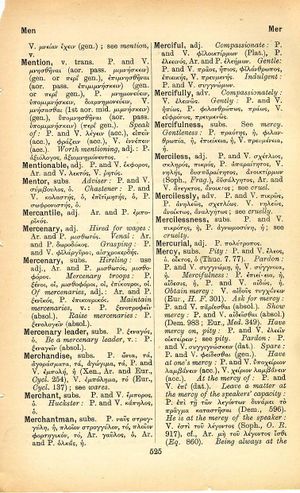mercy
καὶ ποιήσας φραγέλλιον ἐκ σχοινίων πάντας ἐξέβαλεν ἐκ τοῦ ἱεροῦ, τά τε πρόβατα καὶ τοὺς βόας → And having made a whip out of cords he drove all from the temple sheep and cattle
English > Greek (Woodhouse)
subs.
Pity: P. and V. ἔλεος, ὁ. οἶκτος, ὁ (Thuc. 7, 77). Pardon: P. and V. συγγνώμη, ἡ, V. σύγγνοια, ἡ. Mercifulness: P. ἐπιείκεια, ἡ, αἴδεσις, ἡ, P. and V. αἰδώς, ἡ. Obtain mercy: V. αἰδοῦς τυγχάνειν (Eur., H.F. 301). Ask for mercy: P. and V. παρίεσθαι (absol.). Show mercy: P. and V. αἰδεῖσθαι (absol.) (Dem. 983; Eur., Med. 349). Have mercy on, pity: P. and V. ἐλεεῖν οἰκτείρειν; see pity. Pardon: P. and V. συγγιγνώσκειν (dat.). Spare: P. and V. φείδεσθαι (gen.). Have at one's mercy: P. and V. ὑποχείριον λαμβάνειν (acc.), V. χείριον λαμβάνειν (acc.). At the mercy of: P. and V. ἐπί (dat.). Leave a matter at the mercy of the speakers' capacity: P. ἐπὶ τῇ τῶν λεγόντων δυνάμει τὸ πρᾶγμα καταστῆσαι (Dem., 596). He is at the mercy of the speaker: V. ἐστὶ τοῦ λέγοντος (Soph., O.R. 917), cf., Ar. μὴ τοῦ λέγοντος ἴσθι. (Eq. 860). Being always at the mercy of their assailants: P. ὄντες ἀεὶ τῶν ἐπιτιθεμένων (Plat., Pol. 307E). (I think) that the virtues of many should not be at the mercy of one man: P. μὴ ἐν ἑνὶ ἀνδρὶ πολλῶν ἀρετὰς κινδυνεύεσθαι (Thuc. 2, 35).

